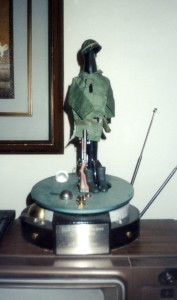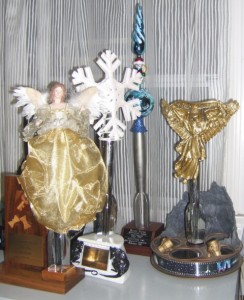By John Hertz, from Vanamonde 863-865: About 1,100 attended Loscon XXXVI, our local convention, currently at the L.A. Int’l Airport Marriott Hotel; Author Guests of Honor Steven Barnes & Tananarive Due, Artist GoH Tim Rickard, Fan GoH Christian McGuire; Art Show sales $6,800 by 47 artists.
In the Art Show, building the Rotsler Award exhibit of the 2009 winner Dan Steffan, I had the help of Jan Bender & Gary Echternacht, Robert Jansen, and Wolfcat. I found Rickard finishing his exhibit and brought him over. Drawing Brewster Rockit since 2004 he knew not our community. “That’s professional,” he said; “you mean this guy is an amateur?” Chris Garcia’s Fanzine Lounge was full of fanzines, fanart displays, and fanziners; España Sheriff and Leigh Ann Hildebrand hosted the Fanzine Lounge by Night on the party floor. I finally brought something Hildebrand would drink.
On Friday afternoon I moderated “Women in S-F,” D.M. Atkins, Due, Shauna Roberts, Sharan Volin. Roberts said publishers think boys won’t read about girls but girls will read about boys. Atkins said her 13-year-old son was very particular. Due said she had a 17-year-old protagonist who was indecisive, like other 17-year-olds. Volin said some games let one pick a female or a male character. A woman in the audience said she missed femmes fatales. Then a book talk on The Man in the High Castle. Bruce Briant in the audience said “Where’s the science?”; in ch. 7 Betty & Paul Kasoura take up that very point. We noted the wealth of falsities: even Mr. Tagomi has an empty briefcase.
After Regency Dancing, I took Sheriff who was off duty awhile to the party Paul Turner threw in memory of Bill Rotsler, though we missed Jerry Pournelle and Tim Powers. Then Keith Kato’s chili. Then the Seattle for Westercon LXV bid party. Two a.m. in Operations, Chinese-style Mah Jongg going strong. Someone said “I’m sorry I didn’t say goodbye to you, I was talking to the police.”
Saturday morning at 10, to moderate “Blurring the Lines,” Atkins, Laura Frankos, Val Ontell. Atkins said different genres have different expectations. I noted how Frankos’ husband de-Anglicized his name to Turteltaub for a different book. Computers, she said, look at an author’s name, and order according to how many the last book over that name sold. Ontell noted how the 2001 book Seabiscuit drew interest outside the horse genre.
Toni Weisskopf took my tour of the Art Show. I was glad to see a set of woodwork spaceships by Johnna Klukas. One, dark as the void, gleamed with stars. Guessing right I used my magic tour-leader power to open the ships: they were boxes. “For the rest of you,” I said, “try this only at home.” Then a talk on From the Earth to the Moon. We liked the pace and wit. It detailed conceiving the project, building, and firing, then ended. I loved Michel Ardan’s superb four words “I won’t come back.”
At 2:30 to moderate “There’s a Bimbo on the Cover of My Book,” Laura Brodian, Amy Casil. Brodian, widow of Kelly Freas, said he read all he illustrated, often several times; yet authors might not grasp illustration, and he used to crack “I prefer my authors dead.” Casil with a lapsize computer showed 200 color images of book and magazine covers suitable to the topic. Then Lisa & Harold Harrigan’s 32nd-anniversary party, where pleasant signs explained 32 = 24 + 42 and 11 + 22 + 33. Then España Sheriff’s Art Show tour. Then shopping with co-hosts Becky Thomson and Tom Veal for the Prime Time Party at which, every Loscon from 1 a.m. Sunday till dawn, we try for good food, drink, talk.
Ten a.m. Sunday, to moderate “World Domination,” Brad Lyau, V.J. Waks, she saying everyone had an internal ape that made us dominate, he full of overseas experiences which, like Lao Tzu, said maybe not. Then a talk on Brain Wave. We praised its poetry, in both the small sense of its choice of words, and the large sense of its choice of incident. We discussed whether its vignettes, which carried breadth, left loose ends. This was a book of pain and hope. Then cleaning, the Dead Dog party and another in the Fanzine Lounge by Night, and eventually home.


